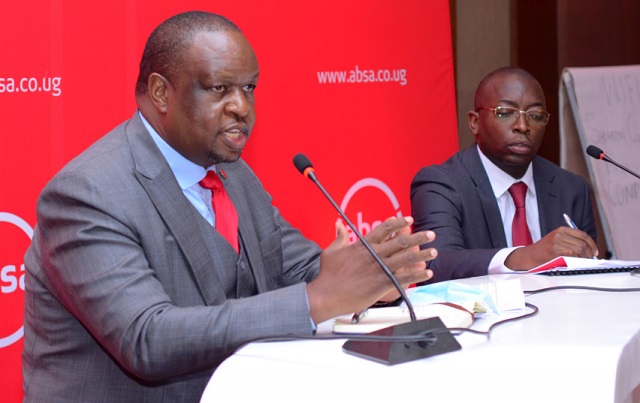
However, the lender remains strong with its capital growing up to 23%, higher than 12.5% regulatory cap
Kampala, Uganda | JULIUS BUSINGE | Absa Bank Uganda Ltd saw its net profit sharply drop by nearly 50% from Shs78bn in 2019 to Shs40bn in 2020 as coronavirus pandemic took toll on the financial sector.
Its financial results released on Apr.20 shows that, income reduced from Shs404bn in 2019 to Shs400bn last year as the pandemic led to a reduction in economic activities.
However, the bank’s executives, said at a press conference, that the performance is not that bad owed to the tough operating environment at the time.
Nadine Byarugaba, the chairperson Board of Directors said 2020 was a unique year and that it greatly influenced the bank’s overall operations.
“The pandemic accelerated our pace to go digital,” she said, adding that the bank’s performance has showed its resilience and competitive in the market.
Absa Bank Managing Director, Mumba Kalifungwa, said the bank’s priority in 2020 was to keep its staff and customers safe by putting in place the required standard operating procedures to contain the spread of coronavirus.
He said, the bank also responded to the Bank of Uganda’s credit relief measures to support businesses and overcome the negative impact of the pandemic.
This saw slightly over 1, 400 of its customers benefit from the relief initiative and about Shs260bn in terms of loans restructured.
“This was a timely intervention to ensure sustainability of the economy and the banking sector,” Kalifungwa said, adding that the bank remains highly capitalized and liquid.
Absa’s total assets increased from Shs3.4tn to Shs3.5tn during the same period under review and so is customer deposits that grew from Shs2.1tn to Shs2.3tn; and total liabilities from Shs2.9tn to Shs3.0tn.
Operating expenses increased from Shs165bn to Shs174bn. Provisions for bad and doubtful debts grew significantly from Shs12bn to Shs60bn. And loans and advances to customers remained flat at Shs1.3tn.
Kalifungwa said; “We remain committed to providing financing to the economy, facilitate trade, commerce and capital formulation for business growth.”
Economy to rebound
Going forward, he said, they remain optimistic that the economy will recover and business will normalise.
However, uncertainty remains even as government rolls out the pandemic vaccine to pave way for reopening of all sectors of the economy.
Micheal Segwaya, the bank’s chief finance officer, said the bank remains strong with its capital growing up to 23%, higher than the 12.5% regulatory cap.
He said, the solid capital will enable the bank to offer key facilities in big sectors like oil and gas, manufacturing, agriculture, health and education, tourism/hospitality.
During the year, costs remained well controlled with a 4.9% growth year-on-year, in line with core inflation for the year ended December 2020.
This was on the back of better cost management and continued investment in technology platforms to increase efficiencies.
Segwaya said, the bank will further manage costs given that the expensive rebranding exercise of the bank ended in the past year.
“We are prepared for growth,” he said.
He said the bank has prioritized investment in innovation to leverage the strength of digital technology to create seamless experiences for customers and consequently, realise their ambition to become a digitally led bank.
****
 The Independent Uganda: You get the Truth we Pay the Price
The Independent Uganda: You get the Truth we Pay the Price



